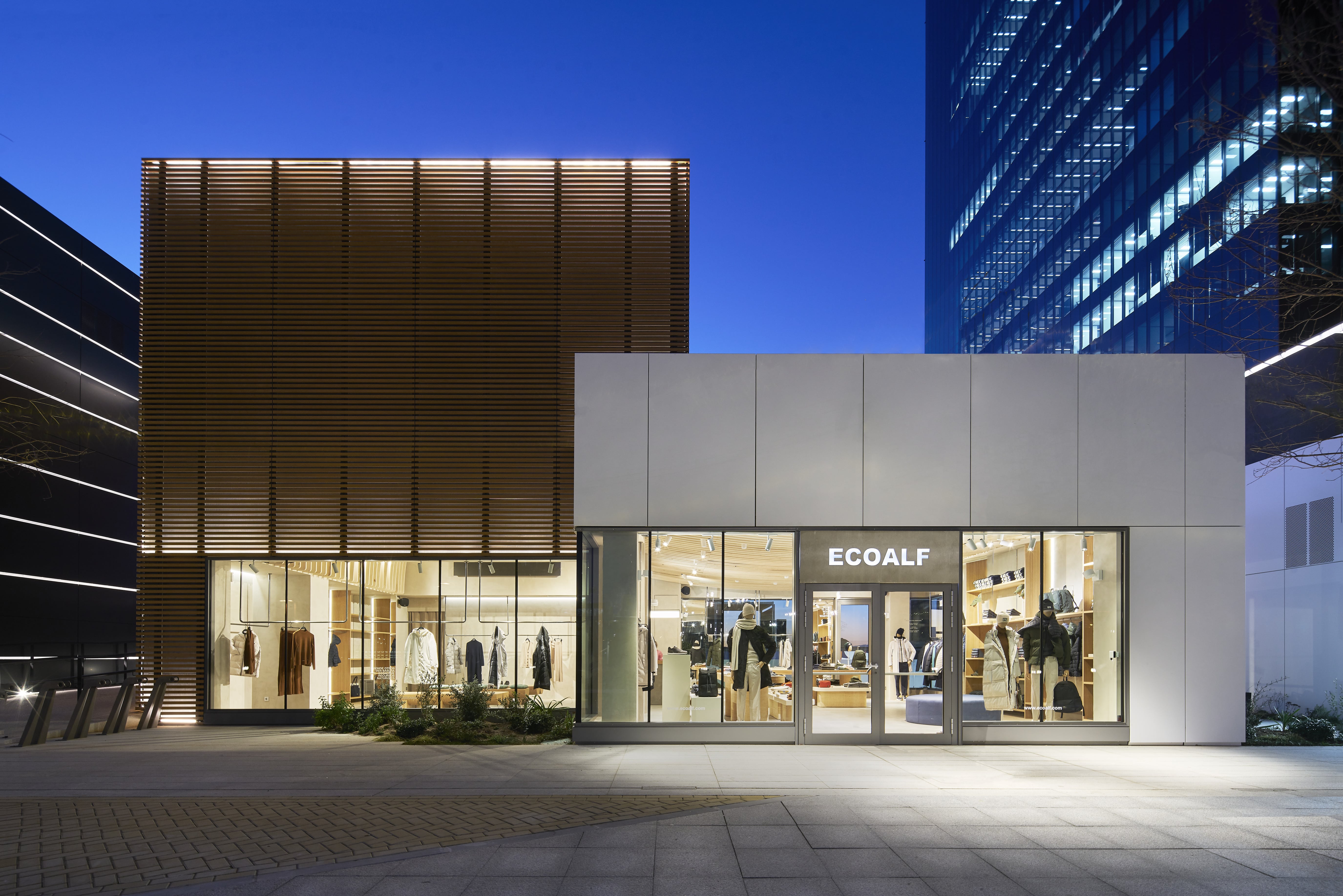Sustainable fashion has ceased to be a trend to become an urgent necessity for the planet. For this reason, more and more companies in the fashion industry are adopting environmental and social sustainability criteria to address the problem of current overproduction and consumption.
What is sustainable fashion and why is it important?
Sustainable or slow fashion focuses on the production of clothing that has the lowest possible environmental impact, while ensuring respect for labour rights and environmental protection. It proposes a new paradigm in the textile industry, offering high-quality and durable garments to promote a longer lifespan for clothing and thus slow down production and consumption cycles.
In contrast, fast fashion is the standard that has laid the foundations of the textile industry so far. Its exponential growth in recent decades has encouraged massive consumption of low-quality garments, continuously offering new styles at the lowest price. This industrial model is highly detrimental to the environment, as it generates millions of tons of waste each year.
In fact, according to a European Parliament article the fashion industry is responsible for 10% of global carbon emissions, exceeding the combined emissions from international flights and shipping. Moreover, water pollution and the accumulation of textile waste in landfills are also harmful situations for the environment caused by this industry.
In this context, more and more companies in the sector are joining the sustainable fashion movement to break the cycle of overproduction and overconsumption and opt for a more conscious and responsible model.
Characteristics of a sustainable clothing brand
The characteristics of sustainable brands are closely linked to the concept of circular economy:
- Use of sustainable materials: they use organic, recycled, renewable and biodegradable materials in the production of their garments.
- Environmentally friendly production process: they implement sustainable practices in the production process, such as the use of renewable energy and the reduction of carbon emissions.
- Socially conscious and ethical: they work with suppliers and factories that comply with fair labour standards and safe working conditions.
- Quality and durability of garments: they manufacture durable, high quality garments that can be worn for years.
- Transparency: they communicate transparently and clearly with customers about their sustainable practices and policies.
The case of Ecoalf: innovation, sustainability, and design
Ecoalf is a Spanish brand that has shown that fashion and sustainability can coexist without sacrificing style and quality. Founded in 2009, the company has become a leader in the sustainable fashion retail sector thanks to its constant innovation in the use of recycled materials in its garments, among other sustainable practices.
The brand, recognised as the most environmentally responsible company in Spain in 2022 by Merco, complements the production of sustainable clothing with social and environmental projects. An example of this type of initiative is the Upcycling The Oceans project, which aims to clean the oceans of marine litter with the help of the fishing sector. This project has expanded to other coastal countries, such as Greece, Italy, and Thailand.
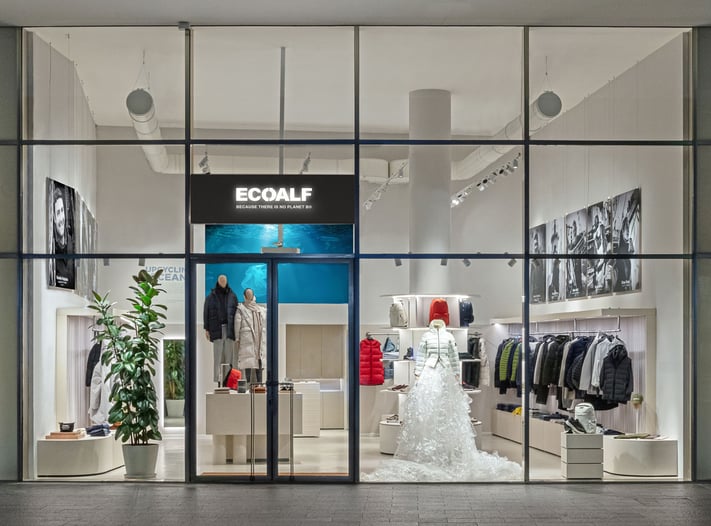
In line with its goal to be carbon emission neutral by 2030, Ecoalf has incorporated its sustainable identity into its shops and trade fairs. To this end, it has worked with Zero Consulting in a consulting process to reduce the embodied carbon and operational carbon of its stores globally.
To achieve operational carbon reductions in their retail space, we have conducted thermal modelling of their shops to prescribe thermal envelope improvements and energy alternatives. In terms of reducing embodied carbon, we have carried out a life cycle analysis of materials, comparing various options to help Ecoalf choose those with the lowest carbon footprint.
Some of their stores where this process has already been carried out are Las Rozas Village, Caleido Store, and Milan Store, of which we explain some details below.
Las Rozas Village
The design of the Ecoalf shop in Madrid's Las Rozas Village represents the melting of the poles, designed by the design studio Nagaimi. The new space, with the aim of raising awareness and inspiring change, evokes a melting glacier from a plastic structure made using 3D printing, which will be recyclable at the end of its life cycle. Las Rozas Village is a clear example of the use of the latest innovations in construction, such as 3D printing.
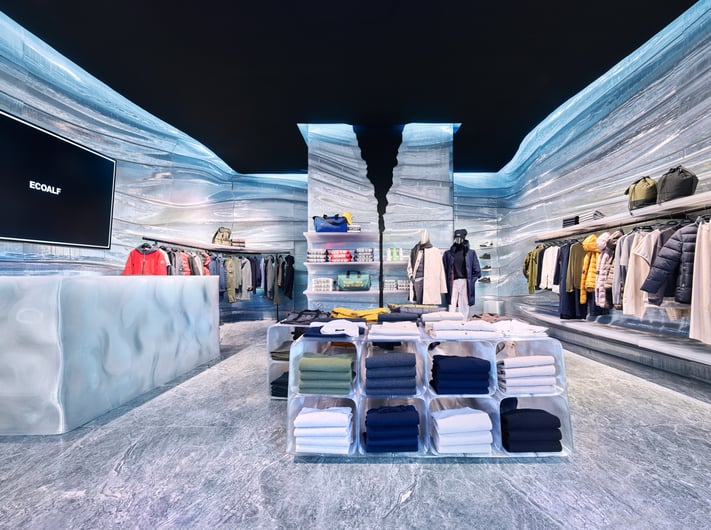
Caleido Store
The Caleido Store is located in Madrid and has been designed by the studio MVN Arquitectos. Based on 3D models made with BIM, all the building and furniture elements have been analysed in order to establish which ones have the greatest environmental impact. The wood used comes from Spanish forests, in addition to using materials such as clay mortar, which naturally regulates ambient humidity. On the other hand, ceramic pavements have a pre-consumer recycled content. The combination of these materials leads to the reduction of the carbon footprint of the store.
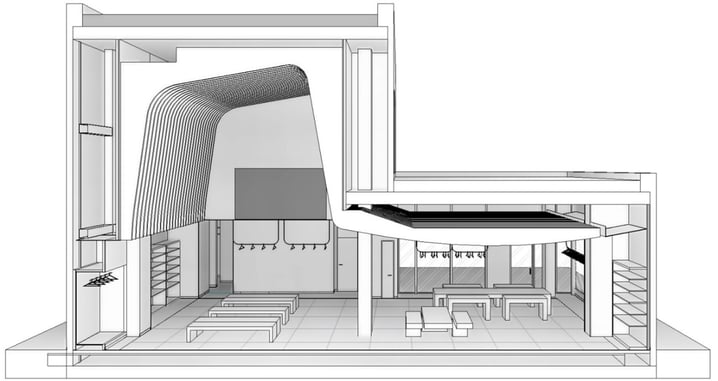
3D model of the Ecoalf Caleido store
An analysis and optimization of the passive behaviour of the building and the influence of the different elements that form the thermal envelope on the heating and cooling demand have been carried out. To meet the store's energy demand, 15 solar panels have been installed.
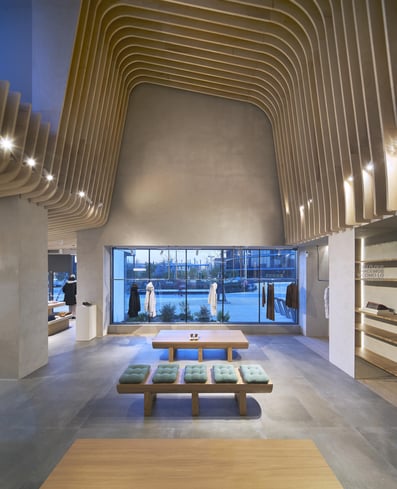
Milan Store
The Milan Store of Ecoalf is another of the decarbonized stores that seeks to be representative of the values of the sustainable brand in Italy. It is dedicated to the fishermen who collaborate on their Upcycling the Oceans project. By 2025, Ecoalf plans to work with more than ten thousand fishermen throughout the Mediterranean to help clean the seabed of waste.
The shop uses carefully selected materials to minimise its impact on the environment, taking into account the climate in which it is located and the energy needs of the shop. They have collaborated with Italian companies that manufacture recycled materials, such as Cimento's flooring and furniture coverings and Kvadrat's side panels, which use recycled fabrics.
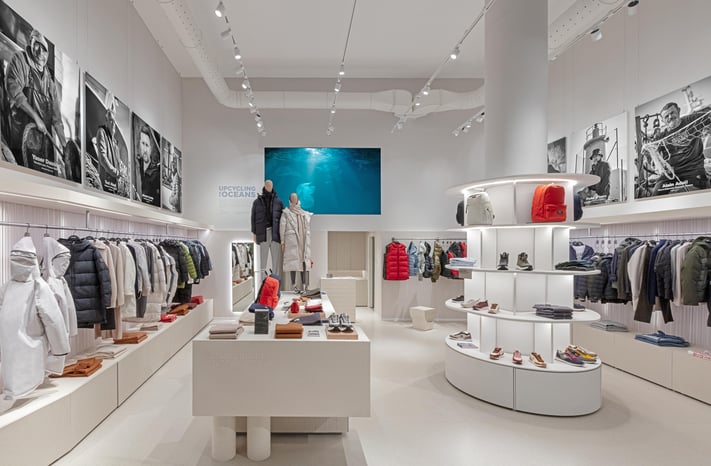
In conclusion, Ecoalf is a brand that has shown that sustainable fashion is not only possible, but essential for a more sustainable future. The fashion industry has historically been one of the most polluting and harmful to the environment, which is why the sustainable practices of companies like Ecoalf are necessary to reverse this context. By adopting sustainable and responsible practices, they are not only reducing their environmental impact but also educating consumers about the importance of sustainable fashion.

